‘We’re not ruling out having a baby’
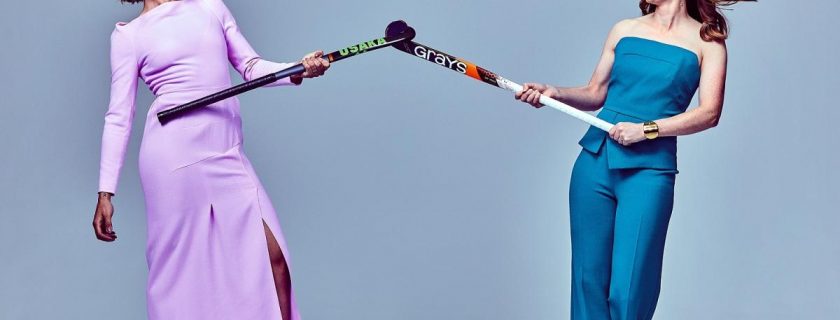
Hockey players Kate and Helen Richardson-Walsh became stars at the Rio Olympics. Here for the first time, the gold medallists talk about coming out and their same-sex marriage. Exclusive interview by Sarah Shephard
When nine million people in Britain ditch their usual Friday night television to watch a hockey match, you know something unusual is happening. It’s almost 12 months since Great Britain’s women’s team won a historic first Olympic gold medal. It was a fiercely dramatic match that would end up being one of the highlights of the Rio Games.
Bedlam broke out following the tense penalty shootout against the Netherlands. Many of the nine million viewers might have assumed that the double-barrelled duo celebrating on the pitch – captain Kate Richardson-Walsh and midfielder Helen Richardson-Walsh – were sisters. It’s an assumption that the couple, who have been together for nine years and married since September 2013, are used to dealing with.
“We often say that we come out every day,” says Kate, 37. “Take yesterday, for example, when we were looking at a flat to buy and the estate agent asked, ‘Which room are each of you going to have?’ We said, ‘Oh, we’re married,’ and you just get that brief moment. If they’re not used to it, it can be an awkward – ‘Oh, oh right.’”
“We’ve had various reactions,” 35-year-old Helen points out.
“Someone has laughed in our face before,” says Kate. “Like in school when you know you shouldn’t laugh, it was like that. A nervous reaction. If you’ve not come across a gay person or couple before, then it’s something new, isn’t it? You’re not quite sure how to deal with it.”
They first met in their early teens as they began their way up the precarious ladder of elite sport.
Since then, Kate has captained the women’s side for more than a decade and become the nation’s most capped female player with more than 350 appearances. Helen is not far behind with more than 300 appearances, despite serious ankle and back injuries keeping her out of action for long periods. Many in the sport regard her as one of the greatest hockey players Britain has produced.
We meet in a quiet pub in north London on a sunny Wednesday afternoon, with Kate and Helen arriving together shortly after their agent. “They like to get the Tube,” he sighs, fetching the drinks – lime and soda for Kate, elderflower water for Helen – before making himself scarce. Some athletes might require “babysitting”. Not these two.

Kate (left), 37, and Helen Richardson-Walsh, 35
The couple are halfway through a week of interviews and appearances, with some house-hunting pencilled in whenever there’s time. (Up until now they’ve always rented, says Helen, pointing out that they were “never able to get a mortgage on our Lottery funding”.) Their final appointment is at the Rainbow Laces summit – an event aimed at promoting LGBT inclusion in sport. After that they will be on a plane back to the Netherlands where they have been based since January, living in the small, wealthy town of Aerdenhout and playing hockey for one of the nation’s best-known club sides, Bloemendaal.
They are planning to return to the UK this summer and put roots down for the first time. Bloemendaal are not paying for the services of these two internationally renowned hockey stars. “It was a verbal agreement made before the Olympics,” says Kate, a little sheepishly. “We possibly should have thought of that a bit more.”
Helen was the first of the two to come out, entering into her first relationship with a woman when she was 21. That relationship ended before she and Kate got together just before the Beijing Olympics in 2008. By then, the pair had been living together for seven years, with Helen dropping out of her human biology degree at Aston University (“I’d been to the Sydney Olympics, come back and went straight to university and just realised, this is not for me”) and moving down to London from her home in Nottingham in 2001.
At the time, Kate was sharing a house with fellow GB hockey player Jo Ellis, and they had a spare room to fill; Helen’s move to London was the perfect solution. “We just got closer over time,” says Kate of the gradual realisation that her feelings for Helen were different from those she’d felt for any female friend before.
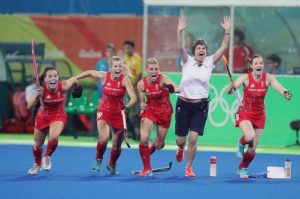
The shift happened at the same time that Kate was moving on from the break-up of her relationship with a former England hockey men’s captain, to whom she had been engaged.
“I just realised it wasn’t right,” says Kate of her previous relationship. “He’s now very happily married with a lovely family and is coaching so he’s still involved with hockey. That’s the thing about the hockey family; it’s small so everybody knows everybody. We shared a lot in common, so it’s nice when we see each other. He’s happy and we’re happy.”
Both pay credit to the support of their families when coming out, saying they have realised how fortunate they are now that their own relationship is in the spotlight. “We’ve received so many letters and messages from people since the Olympics, thanking us for being so open and talking about our relationship,” says Kate. “We know that a lot of people aren’t as lucky as us.”
“I’ve known people who have had really difficult times with their families,” adds Helen. “Although mine were all really supportive, it doesn’t make it any easier. Even though you know they’ll love you whatever, it’s still a really difficult thing to do. Even now when I tell people, there’s a split second where you’re like, do I say or don’t I?”
Helen was the first to come out. She had a relationship with a woman when she was 21
This is the first time they’ve agreed to a personal interview together. They have never had a public “coming out” moment. There was no Tom Daley-style YouTube video announcing their relationship to the world, no big reveal organised in front of their GB hockey team-mates and certainly no glossy magazine coverage of their Henley-on-Thames wedding in September 2013. The Richardson-Walshes are a rarity in the sports world, though – a place where being considered “different” in any way has typically been something to be feared. And while “99.9 per cent” of the public reaction they’ve had since becoming Olympic gold medallists has been positive, there have been exceptions.
“Just recently I had a letter and a few tweets,” says Kate. “In all those letters we get it was just one nasty one. It came as a bit of a shock because it had all been positive. I think it’s because we’ve stepped outside the hockey family and have had a broader reach, but it’s nothing we weren’t aware of and we know some people have to deal with that face to face, which is horrendous. I got a letter and a few tweets: it’s hard but nothing compared with what other people have to deal with.”
Kate’s response was to put out her own tweet, addressed to her “anonymous hate mailer. Thanks for your letter full of hatred and judgment. If indeed I am sent to hell, I’ll see you there #loveislove.”
It was in the period following the Beijing Olympics in 2008 (where GB’s women finished sixth) that Kate and Helen’s relationship became officially known to their team-mates. Although, by then, it probably didn’t come as too much of a surprise, says Kate. “A couple of the girls came to speak to us after the Olympics and we had really good conversations. Then our coach, Danny [Kerry], just wanted to make sure that everyone was aware of it and it had been talked about.”
Thinking back to when she and Helen first broke into the senior international team, Kate recalls that while it was a “supportive environment”, sexuality wasn’t necessarily something that was openly discussed. “I think having a relationship in the team kind of forces that issue a little bit,” she says. “But the team were fantastic.”
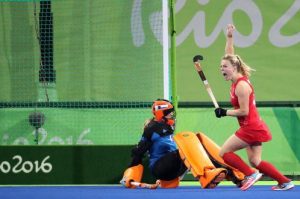
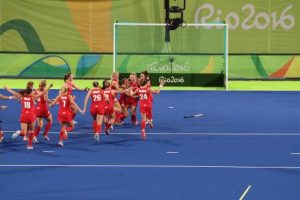
Being in an open same-sex relationship is rare enough in elite sport, but Kate and Helen’s situation, playing alongside each other in the same national team, is rarer still. Before last summer, Cyril and Dorothy Wright were the only married couple to have won Olympic gold when they were victorious in sailing for England at the 1920 Antwerp Games. They had it easy. Not only were the Wrights in a traditional heterosexual relationship, but they were competing in an event where it was just the two of them against the world.
The Richardson-Walshes were throwing their relationship into the middle of an established team dynamic. It was risky. There have inevitably been moments where their feelings for one another have come into play on the pitch. “Obviously, when things have happened to each of us on the pitch, you view it in a different way because they’re not just a team-mate,” reasons Helen. “You’re going to be affected slightly deeper because you care about that person more than a team-mate.”
“I think London is a good example,” suggests Kate.
At the London 2012 Olympics, team captain Kate was smashed in the face by an opponent’s hockey stick during GB’s first game of the tournament against Japan. Suffering a broken jaw that required surgery to stabilise the fracture with a metal plate, she was away from the team for six days, during which time Helen was promoted to team captain. “When that happened, my feeling for Kate was that we’d been on this journey and we’d got to that point where we were hopeful of winning a medal – maybe even gold – and the thought that Kate might miss out on that was …”
When you see someone you love in pain, it’s hideous
While Helen searches for the right word, Kate picks up the story: “At the same time you were made captain and just stepped into that role professionally,” she says, glancing at her wife. “It’s that work thing – you’re doing your job so you have your work face on.”
It was in the two years following London 2012, though, that the couple experienced their sternest test. Helen was suffering from a serious injury and at the same time the team was losing its way under a new head coach.
“It’s the same for any couple that works together, I think,” says Kate. “If everything is going well for both of you, that can be really brilliant because you’re moving in the same direction. If one of you is having a bad time and the other one is having a great time, that’s really tough for both of you, and if you’re both having a bad time that can be even worse. That’s exactly where we found ourselves.”
It was March 2013 when Helen suffered a ruptured disc in her back that left her in agonising pain spreading from her back down into her lower legs. She had surgery to repair it, and following rehabilitation and physiotherapy made it back onto the pitch four months later. But in February 2014 the same disc ruptured again, forcing Helen back onto the surgeon’s table and placing her hockey future in serious doubt.
“It’s so hard,” says Helen, who suffered from depression in that period, particularly when she fell short in her bid to get back into the England squad for the 2014 World Cup. “You see yourself as a hockey player – it’s your identity – and suddenly that’s taken away from you. I very much didn’t want to watch hockey then – I didn’t want to see it because I was so jealous, I guess, of those who were playing it.”
Her wife was one of those forced to press on in Helen’s absence. Speaking to the BBC about the moment she found out Helen had not been selected for the biggest tournament outside an Olympic Games, tears filled Kate’s eyes. She remembers scanning the names on the squad list emailed to her over and over again, looking for Helen’s, before coming to the realisation that it was not there.
“We both dealt with it in the best way we could at the time,” says Kate of that period. “But when you see anybody you love in that much pain – you were in agony at times,” she reminds Helen. “It was just hideous. I’m the kind of person who tries to fix things but in this instance it wasn’t possible and I found that really hard. I felt helpless.”
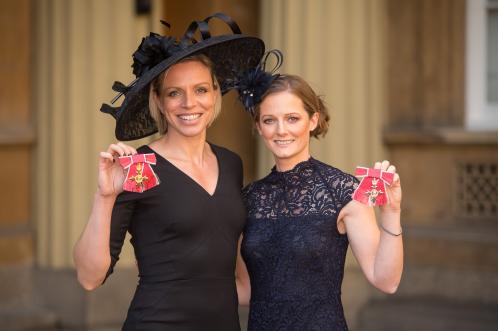
Receiving an OBE and MBE in February
Helen was told she might never play hockey again. The tournament itself was a disaster for England’s women (the team play as England at the World Cup, not GB as at the Olympic Games). Despite being ranked the third best team in the world at the time, they finished 11th out of 12. During the time she was away with the squad, Kate rang home to speak to Helen every day, but the conversations were difficult, as both were preoccupied with fighting their own battles.
“Obviously, I was going through a crappy time,” says Kate, “but you don’t want to unload your crap on someone who’s having an even crappier time and would give their left arm to be where you are. All this stuff is going through your head.”
Helen nods. “It’s one of those periods where you’re actually just grateful you got through it.”
One of the ways they did that was by taking some time away – away from hockey and away from each other. Helen withdrew herself from contention for the 2014 Commonwealth Games that followed soon after the World Cup, and went to Bali where she taught English to locals and planted coral.
Kate stepped back into her role as England captain to lead the team to Commonwealth Games silver – a result that sounds like a positive, coming so soon after the World Cup disappointment, but in reality it was another blow. England had been seconds from winning the gold medal before Australia scored a last-second equaliser to take the final into a penalty shootout that they went on to win, snatching gold from England’s grasp.
The months of turmoil had left Kate feeling drained and, at the age of 34, unsure of her place in a team she had captained since 2003. “I decided I needed a mental break, just for me,” she says, explaining her decision to pack her bags for five weeks of travelling to the Far East, Australia, New Zealand and the USA.
“All these questions were bounding around my head and they were affecting my confidence and self-esteem – my mental health. I felt I needed that bit of time to myself.”
The importance of taking time to themselves as individuals was a lesson they both learnt during that period, says Kate. “We were in this team and completely obsessed with trying to make it the best it could be, which meant we talked about it day and night. It can be exhausting mentally. Helen had her psychology degree to focus on [she has recently completed it, after six years of Open University study], and I needed something I could focus on separately.”
Following last summer’s Olympic gold medal in Rio, Kate retired from the team. Helen is yet to make her decision. With both now in the twilight of their careers, there is also the chance to consider what comes next in terms of their own relationship. Children? “Helen has five nieces and nephews and we love them,” says Kate. “But it is funny, this age – we were laughing last night because my whole Instagram and Facebook feeds are full of babies. It’s something that we’ve chosen to put on the back burner because of our hockey careers – like so many women who put their career first.
“But in a sporting context it’s particularly hard. Although Jessica Ennis-Hill did incredibly well to come back, and there have been others too. For us, it’s something we’re not ruling out. We’ve talked about it and we’ll continue to discuss it, because obviously there are lots of different ways to go about it. It’s just about deciding what’s best for us. At the moment we’re not in a stable place physically, in terms of where we’re living, but once we’ve got roots down I think it will be the conversation we have. The great thing now is that it’s not, oh God, if I don’t do it tomorrow then it’s not going to happen – that mentality is changing.”
Before they head back to the Netherlands, they plan to visit various schools and hockey clubs, aiming to make an impression on as many youngsters – girls in particular – as they can. They have noticed, says Helen, that many of the girls they meet in schools seem to “fear failure” more than their male counterparts. “We want to know why that is. We’re really interested in trying to help girls get the best out of themselves and to be happy with who they are – comfortable in their own skin.”

